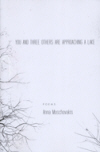You and Three Others Are Approaching a Lake
Moschovakis explains in her acknowledgments that the (rare and odd) books that served as sources for many of the “major poems” in the collection were discovered and purchased at the Bibliobarn, “a miraculous used bookstore in South Kortright, NY.” As it happens, I have been in the most-assuredly-miraculous Bibliobarn in the Hudson Valley, and it would be difficult for any poet to leave this store without an armful of finds that will inform one’s writing for years. The book’s opening from its “[prologue]” makes the best argument for the wonder of the Bibliobarn’s inventory: “The problem is I don’t care whether I convince you or not / In a perfect world I would be able to convince you of this.”
Moschovakis explains in her acknowledgments that the (rare and odd) books that served as sources for many of the “major poems” in the collection were discovered and purchased at the Bibliobarn, “a miraculous used bookstore in South Kortright, NY.” As it happens, I have been in the most-assuredly-miraculous Bibliobarn in the Hudson Valley, and it would be difficult for any poet to leave this store without an armful of finds that will inform one’s writing for years. The book’s opening from its “[prologue]” makes the best argument for the wonder of the Bibliobarn’s inventory: “The problem is I don’t care whether I convince you or not / In a perfect world I would be able to convince you of this.”
Of course, these lines are not about the bookstore but about poetry itself. Between her title, this first couplet, and the explanation about the works’ sources, I think Moschovakis has captured the essence of the poetic enterprise. We’re always approaching something knowing we do not inhabit a perfect world. Art always begins, to some degree, with a problem, and everything we create is influenced by surprising sources, acknowledged or otherwise. Sometimes it’s not clear if a poem is meant to convince us that the problem as perceived by the poet is what’s real and true, and sometimes it’s the poet’s solution we’ll need convincing of.
This is a tremendously exciting book that balances lyrical impulses, family stories, anthropological and historical realities, and metaphysical inclinations. The variety of forms; an astute sense of timing; restraint from excess juxtaposed with exuberance, where appropriate; and the forward motion of an original intelligence at work create an appealing, satisfying, and inspiring set of poems. Readers of my reviews will know that I have a personal bias in favor of poetry that cares about, and makes reference to, its linguistic-ness and works as meta-text, and this poet does not disappoint: “What can a poem kill?” And I’ve made no secret of my preference for poems that break my heart. Moschovakis is adept at getting inside and twisting the knife, too.
Frankly, I can’t do the book justice in this brief review, so much of it defies description and is successful for that very reason:
In translation, compensation refers to the attempt to make up for untranslatability between tongues. For example, by replacing rhyme, less prevalent in some languages than others, with alliteration. Or inventing a pun in line ten of a translation because the pun in line five proved impossible to render.
You may never have a chance to go to the Bibliobarn. But Coffee House Books are not too hard, happily, to find. Approach this one alone or with others. But, approach it!





